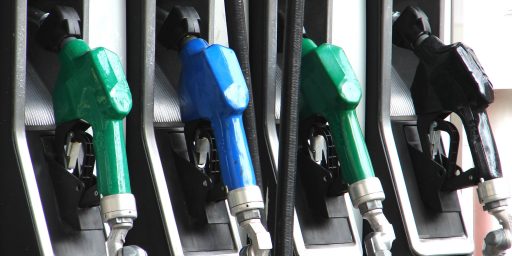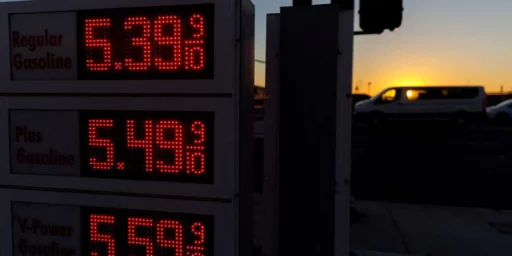Why Makes Gas Prices So Special?
Dan Drezner asks “What is so special about gas prices?” That is, why do people get so exercised over increases in gas prices but not that of other items. His own guesses boil down to the Middle East connection, OPEC and cartels, and the fact that “gasoline is the one commodity in which Americans of both genders possess close to full information.”
Megan McArdle weighs in with much longer a longer list that she summarizes, “people have to buy it; they have to buy large amounts of it frequently; it’s very difficult and painful to economize on; and the cost is highly visible.”
The “visibility” issue strikes me as the most important one. As Megan observes, people “buy it by itself–if the price of milk or orange juice rises, it gets lost in the overall grocery bill.” Otherwise price insensitive people know exactly what they pay for a gallon of gas because it is posted in giant numbers — down to the 1/10th of a cent! — right there on signs visible from the road.
The relative inelasticity of demand for gas — the fact that most of us “have” to drive and that buying a more fuel efficient car, moving closer to work, etc. are not legitimate short term options — is not sufficient explanation for the emotional response that a rise of 10-15 cents a gallon has on people. People who don’t hesitate to shell out $5 for their daily 16 ounce cup of half fat soy mochachino get positively irate over spending an extra $3 a tank once a week for gasoline.
While I understand that there are plenty of working stiffs out there who are living on tight budgets, people are actually paying much less for gas than they did several years ago. Nick Shultz points out that,
American consumer spending on energy as a fraction of total personal consumption has declined considerably since 1980. Whereas 25 years ago, one in every ten consumer dollars was spent on energy, today it’s one in every 16. In other words, what it takes to heat and cool our homes and drive to and from our jobs and vacation destinations is relatively less costly than it was then.
This goes a long way toward explaining why even when gas prices rise this summer–higher than they were throughout the 1990s–people will still be driving more; it’s much more of a value than it was a generation ago
Yet, people will still bitch about the price of gas while they are paying for it along with their $1.10 bottle of water.






As I’ve pointed out our economy is more fuel efficient as well. We use less oil per $1 of GDP than in 1991. So price increases become less harmful in terms of the economy. Doesn’t mean people like paying the higher prices. I know I’d rather spend that extra money on other things like going out to eat periodially or something like that.
Oil prices have risen over 25% since last year–that seems pretty significant.
[[That is, why do people get so exercised over increases in gas prices but not that of other items. ]]
I think in part it’s because it’s so obvious. Gasoline is the one staple product for which we’ve gotten twenty years worth of inflation in just two big jumps. Inflation in the price of other staples happens a few cents at a time, and you can generally find cheaper versions that still cost less — for example, I can walk into any supermarket and find loaves of bread priced at anything from $1.39 to $3.19. But gas prices stayed low for a decade, then leaped a dollar a gallon in the space of two years. Then it stayed low for another five years, before leaping another dollar a gallon in the last two years. On top of that the price went up everywhere at the same time, and you’re lucky to find a variance of ten cents a gallon in any given area. Of course it’s going to be more obvious, and therefore more annoying. I suspect if milk or juice had followed the same price path, people would be snarling about them too.
akdfjo: I’m not sure of the figures but that sounds right. Still, a 25% rise in the price of a relatively cheap commodity doesn’t usually evince the hand wringing we’re seeing here.
If the price of regular unleaded rises from $2.35 to $2.94, that’s 59 cents a gallon. Let’s say your tank holds 15 gallons. That’s $8.85. If you fill up your tank once a week, that’s an extra $460 a year. A substantial sum, to be sure, but not enough to create a lifestyle change for any but the poorest among us.
May I vent a pet peeve? It’s not really at you, James, it’s just at the world.
We don’t have to drive�with or without quotation marks. These are choices. Choices with implications. We could live closer to where we work or work closer to where we live. We could live in a smaller home. Or rent. We could take a job that’s available closer to where we live. We could prepare ourselves to get a job that’s closer to where we live.
Maybe we’d have to accept less money or prepare longer or work for a company we despise. Those are the implications of decisions.
Couching these decisions as though they were forces of nature or laws of physics is mostly a justification for preference.
The unemployment rate in this country is still very, very low. Near full employment. People are making choices to drive more (for whatever reason), getting hit at the gas pump for the decision, and kvetching in the hope that somebody somewhere will do something to bail them out. Rent-seeking by another name.
The average working guy with a family don’t give a damn about what the price of gasoline is in Europe, nor does he care about how mush if the GNP gasoline is. He also don’t care about what the percentage of “total personal consumption is now or was in 1980. He also doesn’t care what the price of orange juice, a cup of coffee or the price for a bottle water cost.
The average know only that gasoline cost to much, that the oil companies had profits of over 320 Billion in the last 3 years and that an oil company CEO got 400 million for his retirement, and that he, the consumer is now paying $ 2.92 per gallon of gasoline.
I laid out several additional things the average working stiff knows in the previous article about MTBE by Steve Verdon, and who will pay the price in the long run for the high price of gasoline.
A note to James:
You know James that I have always been a very strong supporter of Bush. You know that I have strongly supported Bush in the War on Terror, The Iraq War and every other policy he put forth, But, Bush has made a major mistake by not doing more on high gas prices as well as his stance on Immigration. These two stances alone will bring down the Republican Party.
My truck doesn’t run without gas. Either does my wifes car. Without those then my kids don’t go to school, church, baseball, dance, piano, Scouts, camping, and the wife doesn’t go to the grocery store, drug store and so on. If I don’t feel like buying a bottle of water I can go to the faucet. I don’t have a gas faucet.
Jack: Sure. That’s the inelasticity argument. Still, you could consolidate your errand running, carpool, and quit overscheduling the kids’ activities. Further, how much difference does the extra few bucks a week make?
Steve,
The problem is the assumption that GDP growth translates to a ‘peanut-butter spread’ of growth and economic improvement across all social strata, and that ain’t the case. When a significant chunk of working Americans’ wages are barely keeping up with inflation, they are practically living on a fixed income, and any increase in the cost of a non-subsitutable staple hits _hard_.
OK – let me see who wants to reschedule, 2 schools, CCD, League coordinators in 3 divisions, 3-4 Doctors and 2 dentists or…better idea let’s consolidate CCD with the public school or maybe Scouts with the public school that’ll go over great…or maybe baseball and CCD or maybe Doctors visits with dance class or maybe skating and camping. Do you really think anyone besides retirees, DINKS, teens and losers isn’t already consolidating everything possible?
See above – not to say it’s not a good idea and that I don’t already do it whenever I can but whose schedules really line up that much and who isn’t already doing it wherever they can?
My memory is a little unclear – can you cite your personal experience on this subject? Am I not remembering correctly or is it zero? What? I’m not sure I heard you, but thanks for the advice anyway. It brings me back to the Simpsons episode with the lady from SSGTAPP.
Oh yeah, forgot
Since not so much to you maybe you can send a $20 my way every week or so. It’d be much appreciated.
So should the oil companies subsidize your activities, or should the taxpayers?